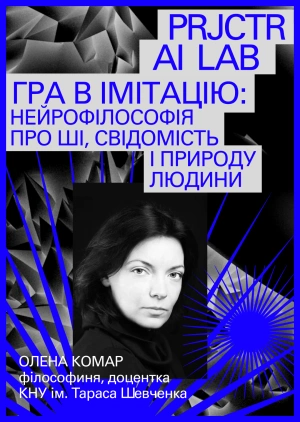Для перегляду відео і коректної роботи
сайту вимкніть плагін AdBlock.
що підходить для вашого екрану.
|
На жаль, «Гра в імітацію: нейрофілософія про ші, свідомість і природу людини» зараз недоступний для перегляду, але ви можете вибрати щось із наших рекомендацій |
|
Канал недоступний
детальніше
|
|
Виявлено проблеми з відтворенням цього відео. |
|
Канал недоступний
детальніше
|

Гра в імітацію: нейрофілософія про ші, свідомість і природу людини

Гра в імітацію: нейрофілософія про ші, свідомість і природу людини
На ранньому етапі розвитку ШІ вважали полігоном для дослідження людської ментальної поведінки, або ж «спробою навчити комп’ютери робити те, що, на думку людей, комп’ютери робити не можуть».
ChatGPT не розуміє сарказму, не грає у мовні ігри і не відрізняє істину від хиби, але те ж саме можна сказати і про багатьох людей, які не здатні відрізнити оригінальний текст від згенерованого нейромережею, твір мистецтва від непотребу, експерта від шайрая. Тому ШІ може стати найкращим помічником плагіаторів і фейкоробів.
Тест Тюрінга перевіряє, чи може комп’ютер імітувати людину розумну, втім соціобіологія наполягає, що сама людина – успішний з точки зору еволюції імітатор, у природі якого більше серійного, ніж розумного.
Під час лекції розглянемо наступні питання:
— Чи помиляється класична філософія, вважаючи розум унікальною рисою людини?
— Чи розкрила нейронаука «природу людини»?
— Наскільки штучними є людське мислення і мова?
Лекторка:
Олена Комар - філософиня, доцентка і лекторка КНУ імені Т.Шевченка та Культурного проекту.
Учасниця програм Книжкового Арсеналу, Visiting Scholar/Professor у Ruhr-Universität Bochum, Visiting Scholar/Professor у Ruhr-Universität Bochum, Fellow у Situated Cognition Research Training Group (RTG) Досліджує когнітивну науку, нейрофілософію, епістемологію, аналітичну філософію і методологію науки
